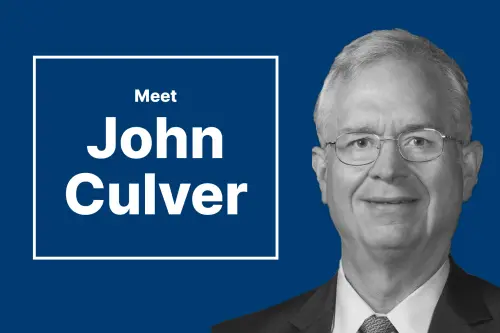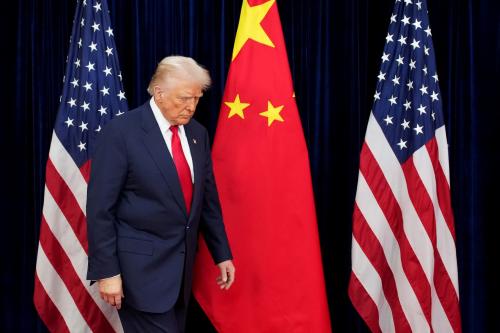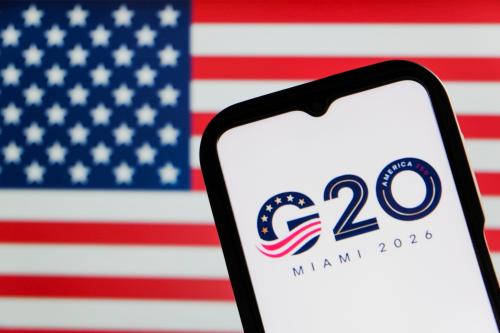Philip H. Gordon joined the Brookings Institution on April 12, 2025, as the Sydney Stein, Jr. Scholar in the Foreign Policy program’s Strobe Talbott Center for Security, Strategy, and Technology after serving as assistant to the president and national security advisor to the vice president in the Biden-Harris administration. He previously served as White House coordinator for the Middle East and assistant secretary for European affairs under President Barack Obama, director for European affairs under President Bill Clinton, and as a Brookings senior fellow.
In the following interview, he discusses his experience in government and some key foreign policy issues with Michael O’Hanlon, Brookings Foreign Policy’s director of research.
Michael E. O’Hanlon:
Phil, welcome back to Brookings. What was the most unsung foreign policy accomplishment of the Biden-Harris administration?
Philip H. Gordon:
It may seem counterintuitive given all the current concern about China, but I think one underappreciated accomplishment was the management of the United States’ strategic relationship with Beijing and the U.S. role in the Indo-Pacific more generally. When we took office in January 2021, there was a plausible case that China might eclipse the United States strategically and economically in the coming four years, or that the two rival powers would clash—possibly even militarily. There was also real concern that the United States would split with its Asian and European allies over China, as those allies prioritized economic ties with the world’s second-largest economy while the United States focused on military threats.
But that’s not at all how things transpired. Instead, the U.S. economy surged ahead, while China’s languished, and now no one is talking about Chinese GDP surpassing America’s anytime soon. Strategically, we deepened military cooperation with key allies like Japan, South Korea, and Australia, and expanded U.S. alliances and partnerships—from the Quad (with India, Japan, and Australia) and AUKUS (Australia and the United Kingdom) to innovative trilateral cooperation with the Philippines and Japan, and with Japan and South Korea.
In Southeast Asia, where Vice President Kamala Harris was deeply engaged and visited three times, we expanded cooperation with Vietnam, the Philippines, Singapore, Indonesia, and others. We also imposed what I think were necessary, targeted sanctions, investment restrictions, and export controls designed to limit China’s military and intelligence threats—but without decoupling our economies or leading to conflict. Finally—and thanks in part to Beijing’s support for Russia in Ukraine; its aggressive actions toward Hong Kong, Xinjiang, and Taiwan; and its predatory economic policies—we deepened U.S. cooperation with Europe in the Indo-Pacific. As our administration came to a close, we had not only avoided major conflict but had opened channels of communication and advanced limited cooperation on the economy, artificial intelligence, military issues, fentanyl, and migration.
We obviously continue to face huge challenges with China, which remains a strategic and economic threat. But compared to what many feared and what could have happened, I think the overall strategy toward the People’s Republic of China and in the Indo-Pacific generally was a major and underappreciated success.
Michael E. O’Hanlon:
Conversely, what was your area of greatest frustration?
Philip H. Gordon:
Without a doubt, Gaza. Hamas’ October 7, 2023, terror attack on Israel was evil and horrific, and Israel had to respond. At the same time, that response resulted in far too many Palestinian civilian casualties and unconscionable living conditions for the population of Gaza. We tried for 18 months to find the balance between support for Israel’s legitimate right to defeat an uncompromising enemy that was holding civilian hostages, fighting from tunnels, and backed by Iran, Hezbollah, and the Houthis, and the need and duty to protect and provide hope for Palestinian civilians. But we have to admit we failed to do that.
Michael E. O’Hanlon:
What do you consider the greatest threats or challenges facing the United States over the next 5-10 years?
Philip H. Gordon:
My team and I actually spent a lot of time thinking about this as we prepared for a possible Harris presidency. I knew we would need to be ready not only to deal with “day one” or the “first 100 days” but with the next four or eight years and beyond.
All these require a longer conversation, but my short list includes:
- Artificial Intelligence. Over the next few years, AI will likely equal or surpass even the smartest humans at a range of complex tasks—imagine having access to the equivalent of a million science or engineering Ph.D.s, working together, at the tip of your fingers. This will provide opportunities for enormous good—in education, health care, and productivity—but also enormous risk—including new bioweapons, disinformation, and massive workforce dislocation. Traditional geopolitical threats will obviously remain important, but it may be that when historians look back at the late 2020s, they will conclude revolutionary breakthroughs in AI were the most consequential development.
- China. As the Biden administration’s 2022 National Security Strategy stated, China is the only world power with the intent to challenge the U.S.-led world order and the potential means to do so. That remains true today and will do for the foreseeable future. China’s size, military power, technology, and economic prowess, combined with its historical resentment and a determination to dominate its neighbors, make it our biggest geopolitical challenge.
- Climate change. As younger people constantly remind me, none of the rest of this matters if our planet becomes unlivable. And unfortunately, for all the progress made on renewables, we are falling behind in the race to limit warming to levels necessary to prevent catastrophic damage.
- Russia. Russia does not have anywhere close to China’s economic capacity, but it still poses an enormous threat—not just in terms of its conventional military but also in the nuclear, space, cyber, disinformation, and asymmetrical warfare domains. China, at least, has a perceived national interest in maintaining a degree of world order, whereas Vladimir Putin’s Russia has truly become a destabilizing actor, threatening not just Ukraine and Europe but increasing military and technological ties with other hostile powers like North Korea and Iran.
- Middle East. As I noted in a recent Foreign Affairs piece, the United States actually has some new opportunities in the Middle East, with a weakened regime in Iran, the military decimation of Hezbollah and Hamas, and new and potentially better governments in Lebanon and Syria. But I’ve been working on the region long enough to know it has to stay on this list. Among other challenges, Iran is still a determined adversary, and the Gaza conflict, alas, is far from over.
Michael E. O’Hanlon:
What do those of us who have never served in the Executive Branch often need to understand more fully or accurately about the nature of policymaking?
Philip H. Gordon:
It’s hard! And I’m not joking. The reality in government is that if a national security issue gets to the Situation Room or the Oval Office, it’s almost by definition really difficult. The issues you grapple with in the White House are almost always tough calls with no good options, like whether and how to withdraw from Afghanistan; how to manage the risk of escalation in Ukraine; what to do about Iran’s nuclear program; how to bridge seemingly unbridgeable gaps among violent actors in Sudan, Venezuela, Gaza, Haiti; or countless other issues from migration to technology diffusion and global health. Add to that the realities of financial constraints, congressional prerogatives, domestic politics, interest groups, and the sheer volume of important issues to deal with in a big world that never turns off, and you get a sense of the challenges every administration faces every single day. One of the biggest fallacies that I think exists in the world of foreign policy commentary is that there are good answers to all foreign policy questions and it’s just a matter of finding them (or getting smarter and better people to make foreign policy). Alas, most foreign policy problems don’t have solutions and require hard tradeoffs, and even the smartest policymakers have to make 51-49 calls that always carry costs and consequences.
Michael E. O’Hanlon:
How can think tanks, scholars, and academics contribute to the policy process, and what are some of the issues you intend to work on yourself at Brookings?
Philip H. Gordon:
I think that’s related to the points I just made. Think tanks and scholars are not—or at least shouldn’t be!—subject to the same pressures of time, politics, hierarchy, and bureaucracy that government officials are. That should allow for deep, thoughtful, nonpartisan, independent research on hard issues with a view to proposing practical ways forward. There’s nothing like being in government in terms of access to information or the ability to impact policy decisions, but a think tank like Brookings provides the opportunity to take a step back, gather and interrogate the facts, put things in perspective, and decide and say what you think about some of the big national security challenges we face. That’s what I look forward to doing here, and I think it’s fair to say there are plenty of such issues to go around.
The Brookings Institution is committed to quality, independence, and impact.
We are supported by a diverse array of funders. In line with our values and policies, each Brookings publication represents the sole views of its author(s).








Commentary
America’s foreign policy challenges: Welcoming Philip H. Gordon back to Brookings
May 6, 2025